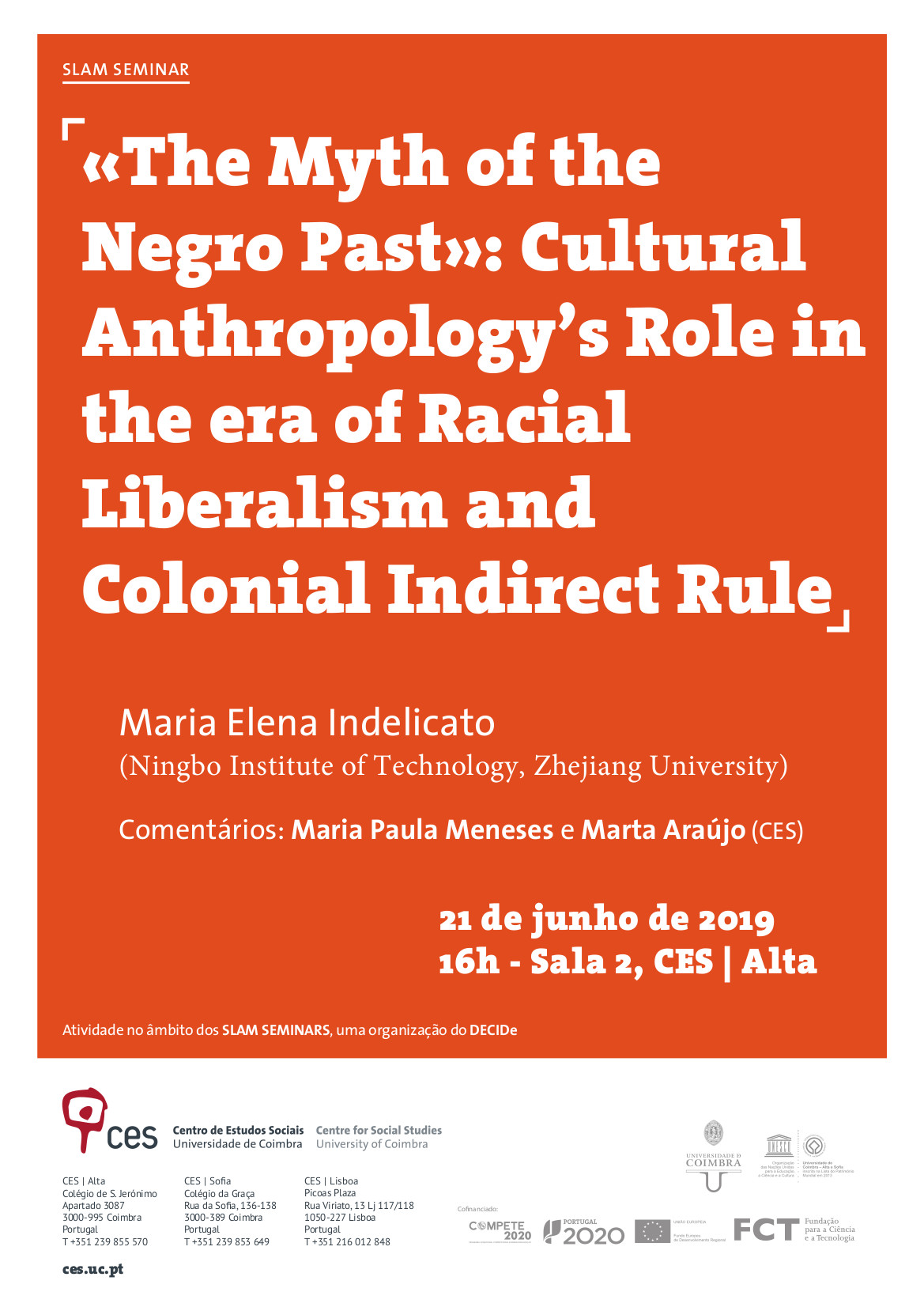Slam Seminar
«The Myth of the Negro Past»: Cultural Anthropology’s Role in the era of Racial Liberalism and Colonial Indirect Rule
Maria Elena Indelicato (Ningbo Institute of Technology, Zhejiang University)
21 de junho de 2019, 16h00
Sala 2, CES | Alta
Comentários: Maria Paula Meneses e Marta Araújo (CES)
Apresentação
The construct of self-concept has become popularised by the Caribbean-British supplementary movement school in the 1950s. Consisting of the idea that Black pupils suffer from low self-esteem, it still represents a tenet of anti-racism education (Andrews 2013). In spite of being the major tenet of the aforementioned disciplinary field, the history of its travels across time and space have never been examined. Self-concept as a knowledge formation has likewise been rarely questioned, mostly likely because of operating in the field of anti-racism (Lentin 2004).
Contra this trend, in the project A Genealogy of Anti-Racism: Cultural Anthropology, Race Displacement and Knowledge Transliteration, I approach the popularity of the aforesaid tenet as one of the most important legacy of early twentieth century’s racial liberalism and, as such, interrogated it genealogically. In light of this objective, in this paper, I unravel one of the central threads waved in the idea of self-concept, which is what American anthropologist Melville Herskovits had defined as “The Myth of the Negro Past.” Indeed, in the years leading to the Second World War, amidst the professionalisation of both race relations and ‘applied’ anthropology, the debate on whether Black Americans had a “past,” meaning a culture on their own, was integral to any discussion of the so called “Negro problem.”
On the other side of the Atlantic, administrators, missionaries and anthropologists (led by Bronisław Malinowski) were similarly debating the effects that “contact” with Western civilisation had had on the culture traditions of the “natives” who lived under colonial rule. As this paper aims to demonstrates, these debates, resulted in the trope of a pathological cultural identity for Blacks in the U.S. and a culturally disintegrating one for natives in Africa with several effects, including the overall problematisation of Black subjectivity as inherently wounded, thus beyond the reach of structural repair.
Notas biográficas
Maria Elena Indelicato received her Ph.D. from the Department of Gender and Cultural Studies, University of Sydney. Besides her monograph Australia’s New Migrants. International Students’ History of Affective Encounters with the Border, Indelicato has published in critical race, feminist and cultural studies journal such as Outskirts: Feminism Along the Edge, Critical Race and Whiteness Studies, Chinese Cinemas, Inter-Asia Cultural Studies, and Paedagogica Historica. She is also the editor of the ACRAWSA blog.
Marta Araújo is Senior Researcher at CES, Invited Researcher at the University of Helsinki (2018-2010) and Invited Lecturer at the Black Europe Summer School (International Institute for Research and Education - IIRE, Amsterdam). Her research work addresses the (re)production and challenging of Eurocentrism and racism.
Maria Paula Meneses is a Principal researcher at the Centre for Social Studies, University of Coimbra. A Mozambican scholar, she accomplished her MA in History from St. Petersburg University and her PhD at Rutgers University. At CES Maria Paula Meneses develops several research projects and teaches in two PhD programs, namely Postcolonialisms and Global Citizenship and Human Rights in the 21st th century. Internationally she co-coordinates, with Boaventura de Sousa Santos and Karina Bidaseca, CES-CLACSO e-learning specialization course on Epistemologies of the South.


